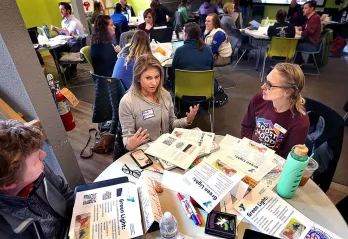
Mental Health Toolkit WI Training

Mental Health Toolkit Training for Wisconsin YMCAs
Story re-published from the La Crosse Tribune
Sarah Johnson yearns for the day when cashiers and baristas ask how your day is going with genuine interest, responding with compassion and, when needed, some words of encouragement.
“I want to help get people comfortable (recognizing) when you ask someone how they are you’re asking about their mental health,” says Johnson, mental health director for the La Crosse Area Family YMCA. “We should not be having conversations about mental health in the corners and the shadows or just at the therapist office. … They should be happening at the gas station and the grocery store.”
Building a culture of mental health literacy is at the forefront of Johnson’s work, and the basis of the Mental Health Toolkit Wisconsin training she developed and kicked off last year.
After being initially introduced to 10 directors at the La Crosse YMCA, who have implemented the trainings and shared feedback during the past year, the Mental Health Toolkit training was expanded Wednesday, with 40 directors from six YMCA locations statewide attending a six-hour session at the YMCA Teen Center.
The Teen Center atmosphere, where “there is an infusion of mental health into the air that we breathe” was an inspiration for the four-part Toolkit, says Johnson. Trainings encompass capacity building, which includes policies and practices concerning mental health; understanding what mental health is and recognizing signs; effective coping skills; and how to respond to challenges.
Johnson says the feedback from those who participated in the first-year pilot has been encouraging, noting that while “as with any culture change it’s not something we are going to see overnight,” the trainees are continuing to become more confident in sharing the Toolkit, with a YMCA Wellness Center director leading a successful training with staff from MOKA coffee shops.
Linda Vanegeren, wellness coordinator for YMCA of the Fox Cities, works primarily with cancer survivors and those new to exercise and believes the training will be helpful in recognizing and responding to the unique fears and stress both face.
“We’re already doing some of this, but (the training) has made me more conscious of what we’re doing and how we’re doing it,” Vanegeren said. “I think the biggest thing is don’t be afraid — don’t be afraid to ask, don’t be afraid to acknowledge.”
Johnson notes the components of the mission “The Y is Medicine” extends beyond fitness, encompassing social connectedness, philanthropy and emotional wellness. It’s a belief Healthy Living Coordinator Sarah Gavin of the Door County YMCA shares, and one she plans to impart on her YMCA colleagues and patrons.
“I know mental-health conditions and illness are an issue and on the rise,” Gavin says. “As Healthy Living Coordinator that’s part of it — it’s not just the physical. It’s about them knowing they have another support system and we care about them more than just their physical health. We care about their mental health.”
While the Toolkit is unique to the Wisconsin, Johnson says would like to see YMCAs and, eventually, community organizations across the globe implement and teach the training to expand the reach and create a chain effect of mental health understanding and embracing.
Says Johnson, “The hope is eventual world domination where everyone is talking about it.”
-Emily Pyrek, La Crosse Tribune


